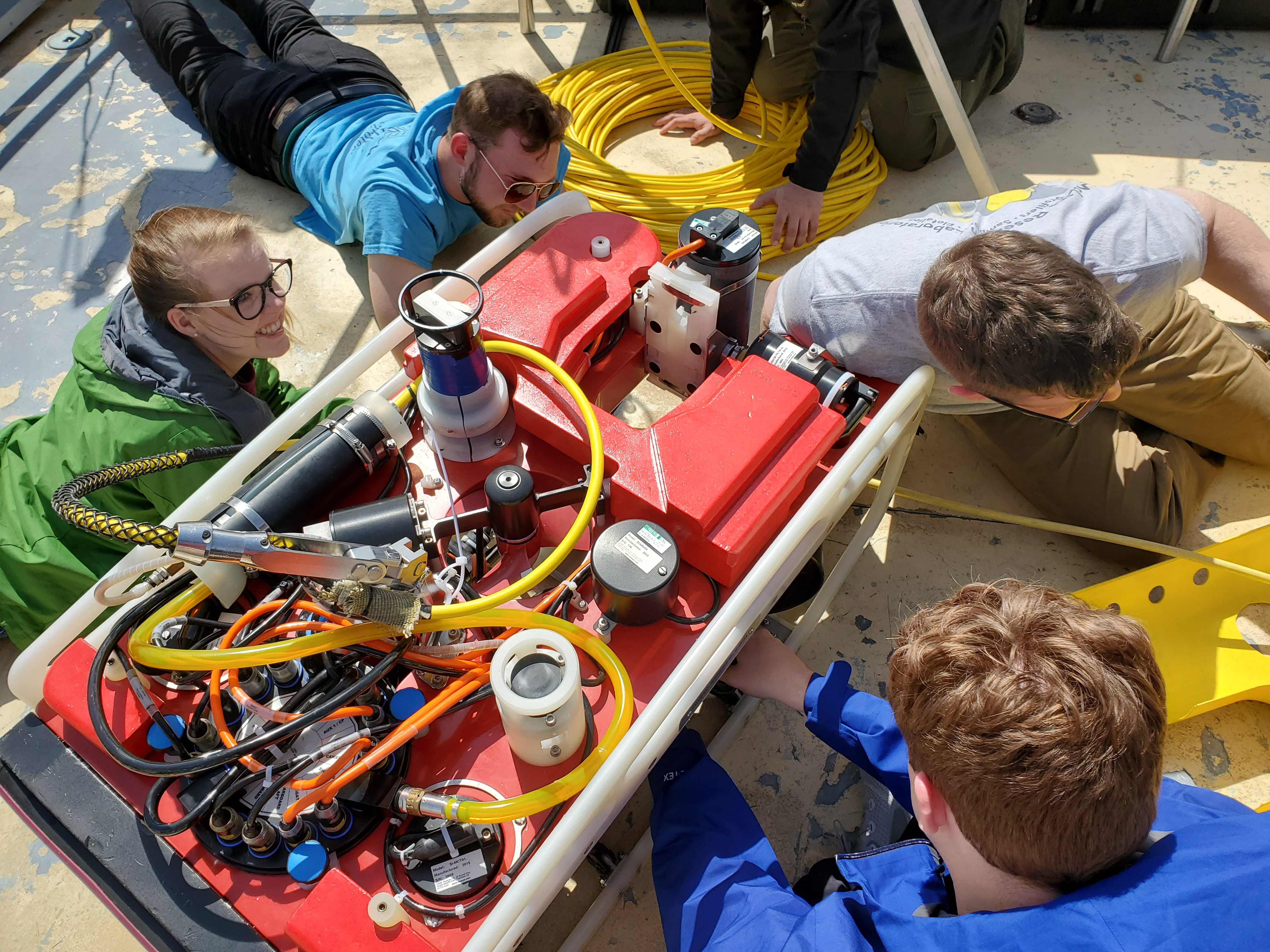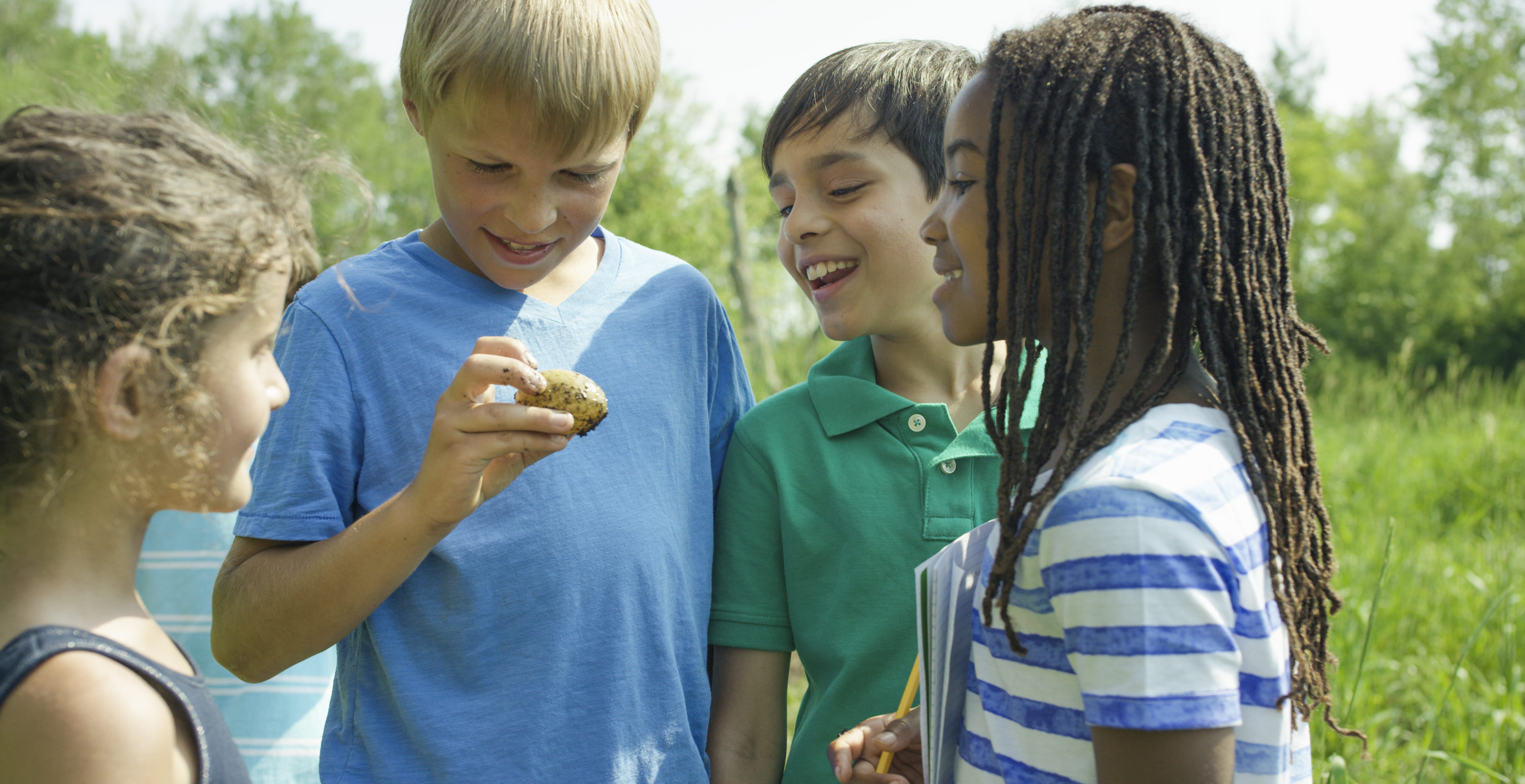The web Browser you are currently using is unsupported, and some features of this site may not work as intended. Please update to a modern browser such as Chrome, Firefox or Edge to experience all features Michigan.gov has to offer.
Thirsty for knowledge? Explore Great Lakes and Fresh Water Week, June 3-11
May 31, 2023
In Michigan, with water all around, there’s no shortage of ways to make a splash. This year’s Great Lakes and Fresh Water Week (GLFWW), June 3-11, focuses on a few: exploring and enjoying our waters responsibly, learning about freshwater systems and how our actions affect them, and prepping for careers in Michigan’s water-centered blue economy.

University students prepare for a remote-operated vehicle dive while attending marine technology bootcamp training activity at Northwestern Michigan College. Photo courtesy of Great Lakes Water Studies Institute, NMC.
Comprising more than 3,200 miles of Great Lakes shoreline – a longer stretch of coast than any state but Alaska – plus 11,000 inland lakes, hundreds of rivers, and drinking water for more than 30 million people, our state’s waters offer unparalleled opportunities to quench a thirst for lifelong education and experience. Michigan’s water wonderland invites connection that can drive lifelong learning and stewardship. That knowledge drives good stewardship of our water resources, and Michigan’s rewarding blue career fields include water-related research, innovation, infrastructure, technology, protection, the maritime sector, recreation, and more.
While the Michigan Department of Environment, Great Lakes, and Energy (EGLE) proclaims GLFWW each year as a focal point for Great Lakes literacy, learning happens year-round, far and wide. Here are a few examples:
Environmental education for all
EGLE’s Environmental Education Program helps Michiganders of all ages understand their role in protecting and improving Michigan’s environment through resources that develop environmental literacy – knowledge of environmental issues, skills and competencies that lead to action, and opportunities to engage in activities that effect change. EGLE’s Environmental Education resources focus on three primary areas: supporting educators, facilitating public outreach, and developing environmental career pathways.
Educators receive support online through EGLE Classroom, which provides lesson plans on Michigan’s environment, professional development opportunities, educational videos, and an educational lending library supported by funding from the Great Lakes Restoration Initiative. EGLE also administers Michigan Green Schools, a program encouraging environmental education and action in K-12 school buildings.
This support improves environmental literacy for teachers and students, but for real “cradle to gray” environmental literacy, efforts extend to college classrooms and the public. EGLE opportunities for learning and action include public presentations and opportunities to participate through a robust training and outreach calendar and volunteer opportunities such as the Michigan Clean Water Corps and the Clean Water Ambassadors.
Becoming environmentally literate leads some people to new career paths. Many people in vital environmental management jobs, such as water and wastewater utilities, are becoming eligible for retirement in coming years. Part of EGLE’s environmental education efforts include partnering with agencies and organizations across the state to raise awareness and build equitable access to the most-needed environmental careers.
EGLE grounds its environmental literacy-building work in core values: Environmental education is place-based, experiential, lifelong, and includes all areas of the state and all ages, races, ethnicities, genders, sexual orientations, and cultural backgrounds. Efforts especially center on communities that have been historically marginalized or excluded from environmental decision making, education, career opportunities, or access to nature. We are all connected – to each other and to our environment – and through learning to care for our environment, we learn to care for one another.
STEM learning grants
Gov. Gretchen Whitmer has called for young Michiganders to learn more about the Great Lakes and advance conservation efforts. And last year, 16 Michigan school districts earned more than $200,000 in grants to develop Great Lakes-based STEM educational programs for K-12 students. The project aims to boost water literacy and empower future Michigan workers to solve complex water issues in a changing world.

Children's natural curiosity is a powerful driver of "3P" STEM learning, based on projects, problems, and place.
The grants continue From Students to Stewards (FS2S), a collaborative statewide water literacy initiative created by EGLE’s Office of the Great Lakes (OGL), the Michigan Department of Labor and Economic Opportunity’s (LEO) MiSTEM Network, and the Michigan Department of Education. FS2S launched in 2020 to find new ways to teach students about the Great Lakes, Michigan watersheds, and the impact of people on water resources. The program engages students by integrating water literacy principles into place-based, problem-based, and project-based (3P) STEM learning across all grade levels.
The MiSTEM Network is reimagining STEM education using transdisciplinary approaches outlined in its new MiSTEM Playbooks – step-by-step guides with resources, implementation tools, and examples of 3P instruction for educators, districts, and business or community partners. The FS2S also created a Freshwater Education Program Database with information about educational programming offered by community partners across the state of Michigan for all ages.
The goal is a Michigan STEM culture that empowers teachers, integrates business and education, and ensures high-quality experiences for all students.
The 16 districts will share their findings from the 2022-23 school year with other districts interested in developing similar programs linking water literacy and STEM.
EGLE’s OGL funds FS2S through the Michigan Great Lakes Protection Fund, the MiSTEM Network, and the U.S. Environmental Protection Agency’s (EPA) Great Lakes Restoration Initiative.
Filling a career pipeline
The Great Lakes Water Studies Institute (GLWSI) at Northwestern Michigan College (NMC) is one example of higher education targeting water-focused careers in Michigan. At a time when the U.S. EPA foresees hundreds of billions of dollars in spending over the next few decades to clean up some 294,000 waste sites across the country, NMC and GLWSI have developed a water quality and environmental technology degree pathway focused on environmental cleanup, remediation, and water quality assessment.
In 2022, the GLWSI program began training a workforce supporting the direct monitoring and cleanup of waters within the Great Lakes watershed and focusing on the direct impact to the quality of our water resources. It bridges gaps in environmental stewardship, scientific understanding, and technical application, culminating in opportunities for graduates.
In 2009, the institute launched the nation’s first associate degree focused solely on freshwater studies and built around interdisciplinary water management, sustainability, and scientific understanding of water resources. The degree program includes partnerships with local and regional organizations and capitalizes on strengths such as NMC’s environmental science and water focus and its campus on Lake Michigan.
Norwegian marine tech provider Kongsberg Maritime supported the GLWSI with hydrographic survey equipment and personnel to train staff, supporting NMC initiatives including development of the marine technology associate and bachelor’s degree pathways and the Marine Center, a professional training center to confer valuable career advancement credentials. Since their creation, the marine technology degree pathways have seen 100% employment of graduates in jobs directly supporting understanding of the Great Lakes and world’s waterways. One of the program’s strengths is numerous partnerships and relationships with industry, governmental agencies, and key players throughout the region and world.
Today, NMC degree programs include water quality and environmental technology, freshwater studies, and marine technology.
NMC also is a partner in the Traverse City Fresh Water Research & Innovation Center now being developed. The Center will be a collaborative hub for freshwater and marine tech applications, research, and public policy affecting the Great Lakes and freshwater systems worldwide. It will include incubation/accelerator space and lab space to support early startup businesses. This project aims to drive economic growth and establish the region and state as a center of technology development addressing water challenges. Other center partners are Michigan Technological University; regional career and business accelerator 20Fathoms; Grand Traverse economic development organization Traverse Connect; and Discovery Center & Pier.
In related efforts to advance sustainable maritime transportation, Gov. Whitmer announced in April the Fresh Coast Maritime Challenge, a first-of-its-kind program in the U.S. addressing recreational boating, marina innovation, and commercial activities on the Great Lakes. The dedicated grant program offers companies the opportunity to apply for assistance that to support decarbonization and electrification of marinas and watercraft across the state.
Great Lakes stewardship relies on developing new businesses to support new technologies and a skilled and environmentally literate workforce ready to enter these new markets. These in turn will fuel more business development, additional new technology, greater care for our waters, and greater student opportunities – a multiplier effect for a vibrant community adding high-paying jobs and filling the talent pipeline for Michigan’s blue economy for generations to come.
Celebrate Michigan waters
“Make a splash” is this year’s GLFWW theme. Here are some of the ways you can jump in:
- Check social media from EGLE, the Michigan Department of Natural Resources (DNR), and the Southeast Michigan Council of Governments (SEMCOG) for GLFWW news, information, and suggestions, using hashtags #MIGreatLakesWeek and #MakeMISplash.
- Virtually attend a water webinar: A SEMCOG webinar titled “Water: Connected for Life” will take place from 1-2 p.m. Monday, June 5, focused on regional water affordability programs, how Southeast Michigan’s water workforce is changing, and how working together to green our region can play an important role in protecting our water resources. Register on SEMCOG’s website or watch the presentation live on SEMCOG's Facebook page.
- Registration also is open for EGLE’s “Building a Water Workforce in the Blue Economy” webinar, scheduled from 1-2:30 p.m. Wednesday, June 7, and featuring a panel of Michigan professionals discussing tools, resources, programs, and partnerships to support filling the water talent pipeline.
- Test your Great Lakes knowledge with daily trivia questions June 5-9 on the DNR’s Mi Nature Facebook page and at EGLE’s Twitter feed.
- Visit EGLE’s Facebook page to make the case for your favorite Michigan waterway and maybe share a photo.
- Fish for free Saturday and Sunday, June 10-11. On these two days, the DNR will waive the need for a fishing license, off-road vehicle license, trail permit, and the Recreation Passport requirement for admission to Michigan state parks and boating access sites.
- Enjoy the outdoors in and around Michigan waterways safely and sustainably by following tips for responsible recreation. Maybe settle in with a great beach read – like the 2022 State of the Great Lakes report.
- Teachers, explore water education resources in the From Students to Stewards toolkit.
- Public officials, explore infrastructure funding opportunities on the Michigan Municipal League Foundation’s MI Water Navigator website.
Information in this article is adapted from 2022 Michigan State of the Great Lakes Report content by Eileen Boekestein and Emily Finnell of EGLE, Megan Schrauben of MiSTEM Network, and Hans VanSumeren of Northwestern Michigan College’s Great Lakes Water Studies Institute.